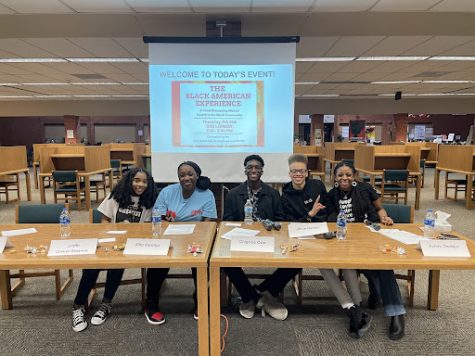Black History Month Recap and History
The story behind Black History Month and what this February looked like for the black community.
Black History Month is a month to celebrate the achievements of African Americans over time for recognition of their important and impactful roles in U.S. history. Known as African American History Month, this honorable month is an expansion of the first-ever African American appreciation, “Negro History Week.” Starting on the 7th of February in 1926, this week of celebration was created by Carter G. Woodson, who was an African American historian, scholar, educator, and publisher.

Since the late 1970s, every U.S. president has officially designated the month of February as Black History Month. to now where other countries around the world, including Canada and the United Kingdom, have come around to also devote a month to celebrating Black history. February was the chosen month to coincide with the birthdays of Frederick Douglass, who was a well-known activist, author, and public speaker, and Abraham Lincoln, the 16th president who is known for fighting for the abolishing of slavery.
From the black population of the United States in 1870 being 4.8 million to now, there has been tremendous growth to 46.9 million citizens, according to recent studies from 2020. Taking 13.4% of the American population, their culture, achievements, and voices are sure to be heard and February is the perfect month for that.
This year, we honor the accomplishments African Americans have brought to society for the greater good. The Association for the Study of African American Life and History (ASALH) designates a new theme for Black History Month each year, which maintains the practice Woodson established for Negro History Week. This year’s theme for BHM is Black Health and Wellness. The theme is even more recent as we enter the third year of the COVID-19 pandemic, which has seen to disproportionately affect minority communities, which created and placed unique burdens on Black health care professionals.
With events all over the country, Colorado made it known to have events every weekend in February, from events like Black Heritage Month Virtual Read Aloud, Demystifying the Black Panther Party and Black Lives Matter Organizations, Buffalo Soldiers: The Forgotten Black Army in the West, and so much more as a way to honor and celebrate black excellence.
Eaglecrest students took this month to reflect and acknowledge black mental health by hosting a gathering to talk about these struggles from our student-led clubs for African American students’, brotherhood, and sisterhood. Members include Amani Giles, Funmi Oladipo, Jakye Nunley, Ritta Karanja, Judith Owusu Sekyere, and Chigozie Ozor.

“Black History Month is a time for people that look like me to feel comfortable and acknowledge the amazing contribution we have made to this country. It’s a way to have a spotlight on us to talk about topics, like this year’s mental health in the black community, that most people don’t know about. This month is a time where we feel comfortable in a country that has in the past made us feel the opposite” Junior Chigozie Ozor said.
Celebrating in all different ways students like Ozor and Amani Giles use February to continue to show off their black pride. “I simply just express myself in my hair, what I wear, and the music I listen to. I am black history and I feel I celebrate it every day,” Junior Amani Giles said.
For years to come the EHS black student body wants to see more open-minded conversations about certain topics and issues. “Issues we have as black individuals that seem to always be looked past, like mental health needs attention” Ozor states. Along with also growing as one to be allies to other minority groups. Giles states that she hopes to see “more acceptance of other groups, racially, gender, and sexuality. We need to grow to be more welcoming to all people, becoming allies.”
This February, in honor and celebration of black excellence and history, is one for the books at Eaglecrest and all other the world. People are coming together to heal pains from the past, lift up and shine on successes, and acknowledge where progress should be made. Years to come can only get better.
Happy Black History month to my black brother and sisters. Always remember, “If there is no struggle, there is no progress” -Fredrick Douglas

Described as passionate and independent, editor Rhyan Herrera has been in Nest Network for three years. After this year, she plans on going to a college...






